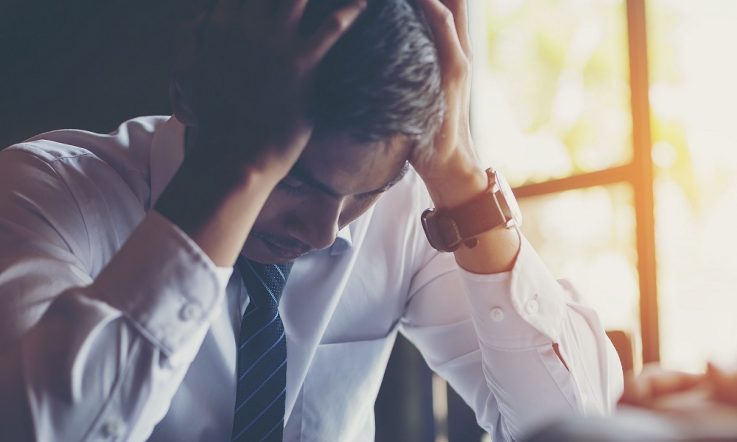Hello, and thank you for downloading this podcast from Teacher magazine. I'm Rebecca Vukovic.
Australia's school principals are overwhelmed by the amount of work they're doing; they're having great difficulty sleeping; and they are experiencing high rates of offensive behaviour and physical attacks, according to 2018 data collected for the Principal Health and Wellbeing Survey. The survey monitors school principals', deputy or assistant principals' health and wellbeing annually. Since it first began in 2011, data has been collected from about 50 per cent of Australia's 10 000 principals.
Associate Professor Philip Riley from Australian Catholic University's Institute of Positive Psychology and Education is the survey's chief investigator and he is my guest in this episode of The Research Files. In today's chat we discuss some of the interesting points to come out of this data collection, and why principals receive interactive feedback after completing the survey. We also discuss the impact that long work hours are having on principals' wellbeing, their family life and their ability to maintain a healthy lifestyle. Let's jump straight in.
Rebecca Vukovic: So the Principal Health and Wellbeing Survey has been collecting data from school leaders since 2011 and here at Teacher we've interviewed you on a number of occasions about the survey. And we're here today to talk about the latest findings from 2018, could you share with me some of the key findings from this collection?
Philip Riley: Yes, well it's sort of Groundhog Day, isn't it? I mean, every year we speak and I tell you that it's got a little bit worse and this year is the same unfortunately. It's not completely true. In Victoria we've had a bit of a turn towards the positive and the Victorian Department of Education instigated a number of new programs around a wellbeing strategy for principals this year and it looks like that has some positive effects, so that's a nice finding. But basically things are getting worse across the board – so work hours, the offensive behaviour levels, threats of violence, physical violence, bullying – all of that stuff is all on the increase. So it is a bit Groundhog Day-ish I'm afraid.
RV: And I'm wondering if there was anything particularly different about the results this time – what were some of the things that stood out to you?
PR: Well, the Victorian one I think is the stand out. It's too early to make any big claims about that because they started their strategy shortly before we collected data and we were either picking up a bit of a sort of honeymoon period around that, and clearly there are some areas in which they've made some significant improvements around policy templates and things like that. …I think principals have appreciated, so there's been a turn towards the positive but it's very small because of the timing of the strategy and then our data collection. So [this year's] data collection will be very interesting to see if that is maintained or increased as the policy starts to take route.
RV: And could you tell me a little bit now about the demographic of the participants in the study?
PR: Yep. So every year we get between a quarter and a third of all school leaders in the country filling out the survey and that's across all sectors, all states and territories. This year we got about, I think it was about 28 per cent, sorry, in the year just gone, our current data year – about 28 per cent. We look at things like ICSEA [Index of Community Socio-Educational Advantage] and match it against the ACARA data and basically we've got a perfect sample. So I'm very confident that the figures that we're returning are quite robust and very representative of the whole country. And that's been the same basically every year and across the eight years of the survey, so far, we've had almost 6000 separate participants so we're talking about well over half of principals in the country have done it at least one and many of those people have done it more than once.
RV: And another thing I found quite interesting was all the principals, deputies and assistant principals who complete the survey receive interactive feedback that's tailored to their own specific contexts. Could you tell me a little bit more about that and the benefits that it offers those educators?
PR: Yeah sure. Because they're so busy, when I first set this up there was no way I was going to not give each individual who completed a survey something really useful for themselves. A lot of researchers come in, say ‘thank you very much', disappear, nobody knows what happens with the findings or whatever. And clearly principals are very busy people and I wanted them to get some real benefits. So we set up an automatic reporting system that kicks in as they complete the survey and it calculates their own, quite detailed, individual picture of their own health and wellbeing and takes them to an interactive webpage where they can measure themselves against the general population and against other principals on 45 different dimensions of their own health and wellbeing – all the way through from workload, things like that – to the levels of burnout and sleep difficulties and things like that that they're experiencing. And there's some advice around that connected to their results.
So their results are blocked into groups of low risk through to high risk. And one of the things that we offer to those individuals is also a ‘red flag system' so there are some key areas in that report which is quality of life. If their quality of life is two standard deviations below the mean for principals they'll get a red flag email from the system that says, ‘you maybe need to think seriously about how you're conducting your work practices'.
And there's a self-harm question in there as well so clearly if they're saying they feel like self-harming or have in the past week – that will generate a red flag again warning that things are not good. And the final way is a composite psycho-social risk which is a much bigger calculation across three quarters of the questions of the survey. And again we calculate the risk to people and put them into low or no risk, low risk, medium, high and very high and if they fall in the high or very high groups, they get a red flag email and the sad news about all of that is this year, a third of principals in the country got a red flag. So one in three are clearly showing signs of distress.
Usually, the email comes with my contact details and people contact me and say... For most people, it's not a surprise, it's just a confirmation of what they already know about how they're travelling. For a few people, it is a surprise and the people who are not surprised, some of them have done a fair bit of thinking and soul searching and we encourage people to probably discuss their results with their GP and maybe think about a personalised health plan and other lifestyle changes.
But the real issues I think, given so many of them are getting a red flag email is that the system itself is not working. So there's too much pressure coming at them from outside, which of course, turns into stress at some point inside the individual. And eventually people don't cope as well as they might. So I think it's a pretty sad indictment on the system as it's currently configured across the country and the thing about it is it's very uniform. The red flags are in every state and territory, they're across all three sectors. I think it's clearly a picture of the system, not the individuals. Although the individuals are suffering.
RV: And work hours is now something I'd like to talk about and I imagine it impacts on this as well.
PR: Oh, absolutely.
RV: Yeah because the results found that principals are working far too much. On average 53 per cent of Australian principals worked upwards of 56 hours each week during terms. And during school holidays approximately 40 per cent work upwards of 25 hours per week. So of course what impact do these hours have on a principal's wellbeing and their ability to maintain a healthy lifestyle as well?
PR: Well clearly when you're doing that many hours at work, you're not taking care of other things that are important in your life like your family. So one of the other measures we have is a measure called work/family conflict. So that's running at about 2.5 times or just under 2.5 times of the population rate. Now family conflict is work continually getting in the way of your family functioning. It's the ‘I can't go to the birthday because I've got to stay back and do something at school'. Or there's an after school meeting, or whatever.
And it's just long hours – that's really all around this increasing accountability framework that principals work in. So there's a lot of compliance work that they have to do and it just takes a lot of time. And that leads to what we call moral stress in the literature so that is, I'm doing so much of this accountability work that I can't do the work that I really should be doing as a principal which is leading teaching and learning in the school. And they see that as a moral stress because they're not doing what they should be doing. So that kind of compounds this idea of work hours, that they're doing so much work so they try to do the teaching and learning and then save the other stuff up for when there's nobody around in the school. And they're doing all the compliance work then, but that interferes a lot with their family functioning. So it's a bit of a vicious cycle.
RV: And given all that we've spoken about today, it's quite interesting that again in 2018 school leaders report significantly higher job satisfaction that the general population. So why do you think this is?
PR: I think they know that they're doing really important work. I think that also leads to the moral stress, they're not doing as much of that as they think they can do and are capable of, because they're doing too much compliance work. But they know that they are contributing to the next generation of Australians, they're changing lives and in many cases, they're turning lives around. And that's a wonderfully satisfying thing to be able to do and say at the end of the day. I really helped that person.
RV: And just finally then, the report suggests that the wider community has a role to play in improving conditions for school leaders. It suggests that the community actively supports its local school and working to stop all offensive behaviour directed at school leaders. So in your view, how do we achieve this outcome?
PR: That's a really difficult one, isn't it? Because principals aren't the only people who are working long hours and the last thing that most people who are working long hours want to do is go and do extra volunteer work as well. But I think if we don't as a society take some decisions that we do want to look after our local schools and we do want them to really flourish, whether your children go there or not, it would be good for every community to have a highly successful and well-functioning school around the corner. And there could be all kinds of ways that communities can help to make that happen. By providing resources, or just being around, just supporting people. We've got a fairly strong blame culture in Australia which I think we need to kind of set aside a bit and start saying ‘how can I help?' Rather than, what somebody else ought to be doing.
That's all for this episode. To keep listening or to download any of the podcasts in our archive, just visit acer.ac/teacheritunes or soundcloud.com/teacher-acer. The full transcript of this podcast is available at teachermagazine.com.au. That's where you'll also find links to subscribe to our podcast channels, or to our email bulletin, so you never miss a story.
As a school leader, do you regularly set time aside to focus on your own health and wellbeing? Does this include looking closely at the time you’re putting into work and the impact this has on your family and friends?
The full survey and its 15 detailed recommendations are available here (14.9MB).



